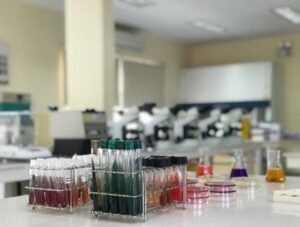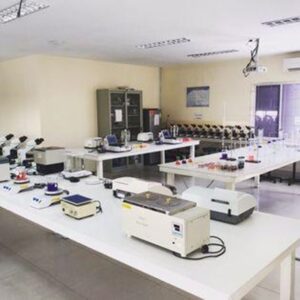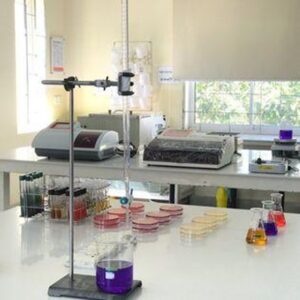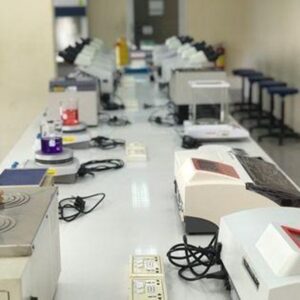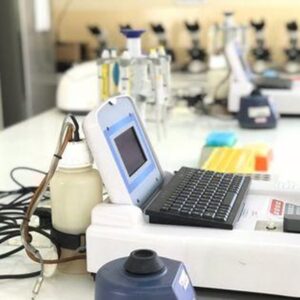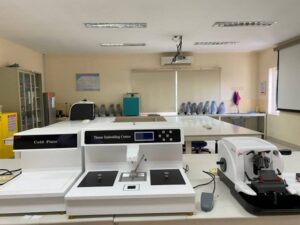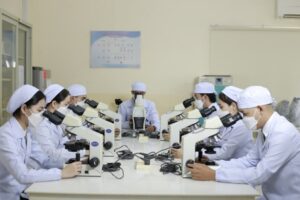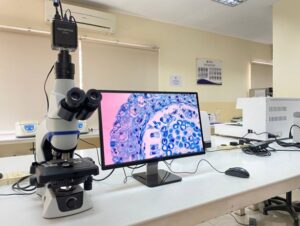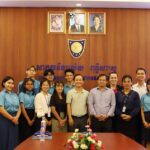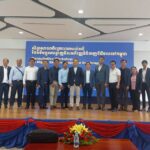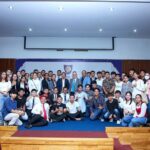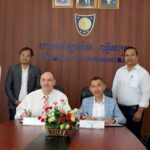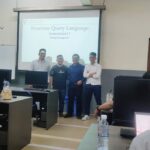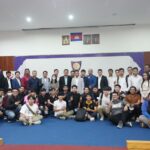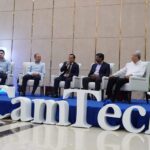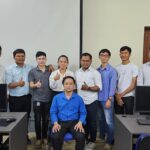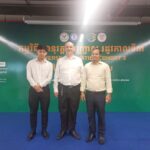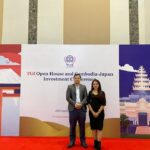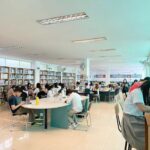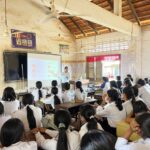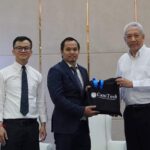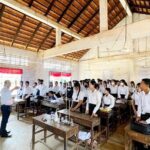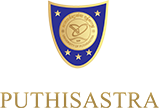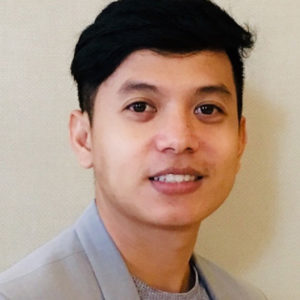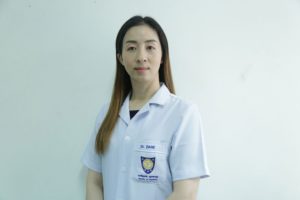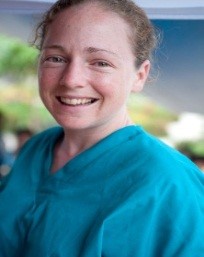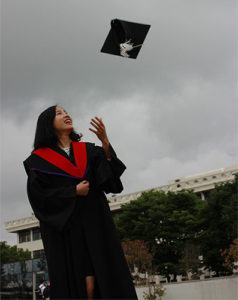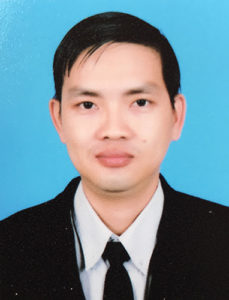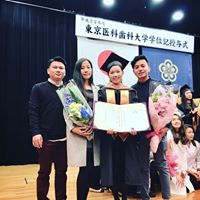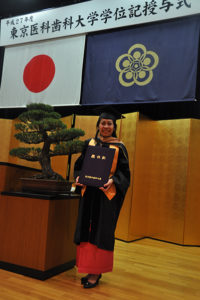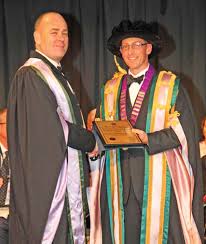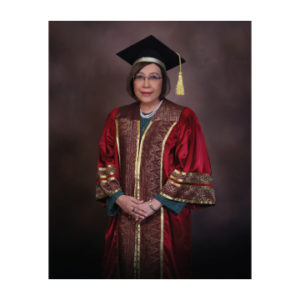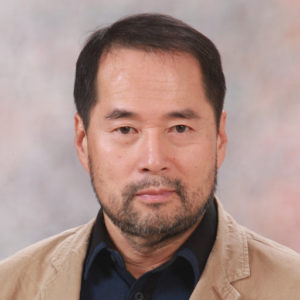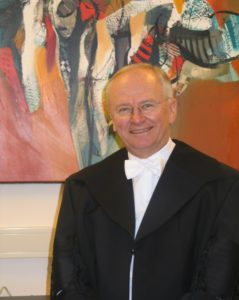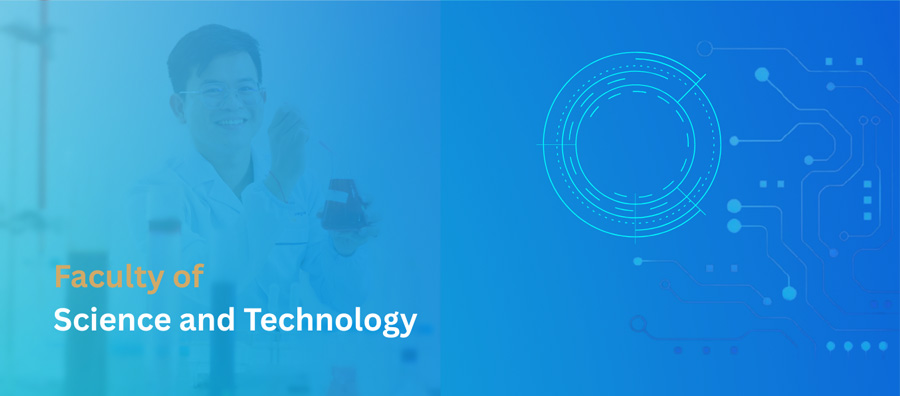
OUR MISSION
- Information and communication technology
- Science Research
IT professionals play a crucial role in helping organizations adopt and integrate new technologies, such as cloud computing, data analytics, and cybersecurity solutions in the modern world. The Cambodian government has recognized the importance of the digital economy and has developed Cambodia Digital Economy and Society Policy Framework 2021-2035. This includes investments in IT infrastructure, digital literacy programs, and incentives for tech startups. Cambodia’s digital economy is expanding rapidly, leading to an increased demand for skilled IT professionals. Many businesses in Cambodia are undergoing digital transformation to remain competitive and efficient. Companies in various sectors, including finance, e-commerce, and telecommunications, are constantly seeking IT experts to support their operations and innovation efforts.
Therefore, IT graduates open up a wide range of job opportunities to solve local and global challenges through technology-driven solutions and innovation hubs, and to create their own technology-driven businesses which contribute to the country’s economic growth. IT Graduates tend to earn competitive salaries, and there are opportunities for career advancement in this field. They can find employment as software developers, network administrators, cybersecurity specialists, data analysts, and more, both within Cambodia and internationally.
At the University of Puthisastra, we believe in nurturing the tech leaders of tomorrow. Our IT Department is dedicated to providing a dynamic and cutting-edge educational experience that equips students with the skills and knowledge needed to excel in the fast-paced world of technology with the quality provided from the faculty to ensure the students who graduate are able to be the Future Leader of Technology.
As Cambodia is becoming more technologically advanced and research focused there is an increased need for professionals with a practical and solid scientific background who are able to provide research support in a variety of fields including chemical-, pharmaceutical food- industry, cosmetics, environmental biology, agriculture, forensics, etc.
No such degree is currently offered by tertiary education institutions in Cambodia
This program is designed to successfully prepare graduates with underpinning knowledge and skills for a range of occupations and industries in a diagnostic/research setting in the natural sciences These include work in food testing research, environmental, agriculture, beverage industry, NGOs, public policy, public health research, private research organizations such as NAMRU, IPC, etc., as well as being in pole position for jobs as Cambodia’s research capability expands. Furthermore, the degree can serve as a foundation for continuing education in a variety of fields.
Program OutcomesTo produce graduates that understand fundamental scientific principles and can apply their knowledge, skills and intellect on original research. Graduates' ability to analyze these scientific questions derives from competency in theoretical knowledge as well as hands on experience with fundamental scientific techniques and a profound understanding of analytical methods.
EDUCATION PROGRAM
| Program and Degree | Study Period | Program Details & Outcomes |
|---|---|---|
| Bachelor of Science in Information Technology | 4 Years | The Bachelor of Science in Information Technology
combines technical skills with real-world business insights to increase your employability in the ever-changing digital world. Student study foundation and fundamental courses at year 1 and 2. Students have the opportunity to select their major based on their interest and profession at year 3in either one of the following
|
| Bachelor in Science Research | 4 Years | The Bachelor in Science Research
This program is designed to successfully prepare graduates for a range of occupations and industries in diagnostic/research setting in one of the fields of natural sciences, which include work in food testing research, beverage industry, NGOs, public policy, public health research, private research organizations such as NAMRU, IPC, etc., as well as being in pole position for job as Cambodia’s research capability expands. Furthermore, the degree can serve as a foundation for continuing education in a variety of fields. click here
|
| Master of Science in Information Technology (MSIT) | 2 Years | The Master of Science in Information Technology (MSIT) is designed for students working in the ICT industry. It enables students to study in-depth, a range of advanced specializations in an emerging field in Data Science Cloud Computing such as Cloud Infrastructure, DevOps, Security, AI, Machine Learning. Besides building the technical skills, the Master’s program also emphasizes Business skills (Entrepreneurship, Business Intelligence, Business Analytics) and Soft skills (Leadership, Project management). To see the program details click here |
Faculty Team Members
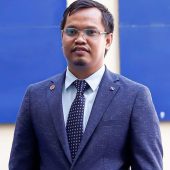
Assoc. Prof. Dr. Tam Sakirin, B.Sc(IT), M.Sc(IT Management), Ph.D (Computer Engineering)
Dean, Faculty of Science and Technology
Tel: (+855) 81 94 85853
Email:tsakirin@puthisastra.edu.kh
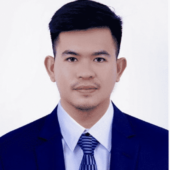
Mr. Be Sokkeang, BSc. Biochemistry, MSc. Industrial Chemistry
Science Research Program Manager
Tel: (+855) 96 370 9863
Email:bsokkeang@puthisastra.edu.kh

Mrs. Chem Sokea, BSc. (IT), MSc. IT
ICT Program Coordinator
Tel: (+855) 972396662
Email:csokea1@puthisastra.edu.kh

Miss Khon Mantha, B.Sc(English) – ICT Administrator
Tel: (+855) 61 380 544
Email:kmantha@puthisastra.edu.kh
News & Events

Open for Application: Erasmus+ Student program 2025 in Turkey Universities

Strengthening Collaboration: Angkor Intellectual Academy (AIA) Campus tour and ICT Program sharing session

ICT students attended Seminar Climate Resilience and Energy Transition at the Office of the Council of Ministers

Workshop on Risk of AI in Education and Business
FACULTY RELATED
Information Communication Technology
- International Relationship
- Human Resource
- Research
- Facilities
- Achievements
- Schedule for Classes
- Admission Criteria
- Laboratories
- Career Development&Exchange Program
Our department assists students in securing internships and job placements, preparing them for a successful career in IT. The Year 2 students are supported by providing the opportunity to do the internship during 3 to 6 months with the partnership companies to enhance their experiences and knowledge to be ready for the real careers’ development paths. UP has strong collaboration with international universities where students are exposed for student exchange for up to one year at oversea universities (Kyondong Univesity-Korea). Furthermore, UP is a bridging university where the students have opportunity to pursue their study at European after completing foundation year at UP.

The Faculty of Science and Technology boasts an exceptional and highly qualified academic staff dedicated to fostering a dynamic learning environment. Comprising industry experts, and researchers, the faculty members bring a wealth of experience and cutting-edge knowledge to their respective fields. Their commitment to excellence is reflected in their rigorous academic standards, innovative teaching methodologies, and active engagement in research and development. With a focus on staying abreast of the latest technological advancements, the academic staff at the Faculty of Science and Technology ensures that students receive a comprehensive and up-to-date education that prepares them for the rapidly evolving landscape of information technology. This commitment to quality is further underscored by the faculty’s dedication to nurturing critical thinking, problem-solving skills, and a passion for lifelong learning among their students, thereby shaping the next generation of leaders and professionals in the field of ICT.
The Faculty of Science and Technology is renowned for its exceptional research culture and commitment to advancing knowledge in the rapidly evolving field of technology. The faculty places a strong emphasis on fostering a vibrant research community, joining with UP-Research Center and other UP faculties, comprised of faculty members, researchers, and students actively engaged in groundbreaking projects. The research conducted at the Faculty of Science and Technology is characterized by its interdisciplinary nature, addressing contemporary challenges and exploring innovative solutions. Faculty members are often involved in collaborative efforts, both nationally and internationally, contributing to the global discourse on ICT. The faculty's dedication to staying at the forefront of technological advancements is evident in the numerous research publications, and projects that emanate from its research endeavors. The quality of research at the Faculty of Science and Technology not only enhances the institution's reputation but also provides students with valuable opportunities to participate in cutting-edge projects and gain hands-on experience in the forefront of technological innovation.
The Faculty of Science and Technology equipped with state-of-the-art facilities that foster a conducive learning environment for students pursuing excellence in the field of technology. The faculty boasts modern classrooms, well-equipped computer labs, and collaborative workspaces, providing students with access to WiFi and the latest hardware and software technologies. Moreover, the faculty continually invests in upgrading its infrastructure to ensure that students have access to cutting-edge tools and resources, preparing them to meet the demands of the ever-evolving ICT industry.
The Faculty of Science and Technology has achieved notable success in various dimensions, affirming its position as a hub of excellence in the realm of technology education. The faculty takes pride in its faculty members who have garnered recognition for their impactful research contributions, with numerous publications in reputable impact factor journals and was invited as guess speaker/presenter at many panel discussions. Additionally, the faculty has successfully fostered an environment that encourages students to excel, leading to commendable achievements in hackathons, coding competitions, and innovation challenges on both national and international stages. The strong collaboration between the faculty, oversea partner-universities and industry partners has resulted in practical applications of excellence academic and research innovation.
- Year 1 (Foundation Year): Day time classes (8:30am – 5:30pm)
- Year 2: Day time classes (8:30am – 5:30pm)
- Year 3: Evening classes (5:30pm – 8:30pm)
- Year 4: Evening classes (5:30pm – 8:30pm)
- Master Year 1 and Year 2: Week-end Class Saturday 1pm – 5:30pm. Sunday 8:30am – 5:30pm
Bachelor Degree:
- Year 1 (Foundation Year): Pass upper secondary High School National Exam (Grade 12) / BACC II
- Year 2: Pass any Foundation Year of any recognized Higher Education Institute
- Year 3: Students must have an Associate Degree in IT or any related field
Master Degree: Students must have a Bachelor in Information Technologies or any related field
UP is located in central Phnom Penh, equipped with modern laboratories and facilities that provide a hands-on learning experience. The ICT students will study their course subjects in the Computer Lab which allow the students to practice the skills along with the theory.
Our department assists students in securing internships and job placements, preparing them for a successful career in IT. The Year 2 students are supported by providing the opportunity to do the internship during 3 to 6 months with the partnership companies to enhance their experiences and knowledge to be ready for the real careers’ development paths. UP has strong collaboration with international universities where students are exposed for student exchange for up to one year at oversea universities.
Science Research
- International Relationship
- Human Resource
- Research
- Facilities
- Achievements
- Schedule for Classes
- Admission Criteria
- Graduation Criteria
- Career Development&Exchange Program
Science Research programs in the Faculty of Science and Technology assists students to do clerkships and internships and prepares them for a successful career in their field. Starting from year 2 on, the faculty supports the students by providing the opportunity to do clerkships and internships with hospitals and partnership companies to gain more experiences and knowledge to be ready for the real careers’ development paths. In addition, UP has strong collaboration with international universities where students are exposed for study exchange such as Thailand, Vietnam, Malaysia, American, Australia, Philippine..etc. Furthermore, UP’s Foundation Year programmes have been certified by IFG, allowing students to apply for UK, Australian, and other international universities’ programmes when they complete Foundation Year at UP. For more information about the opportunities to use UP’s Foundation Year programme to launch into an international degree. click here
The Faculty of Science and Technology is aiming to provide the best human capital with the best skills performance and knowledge to the society.
Faculty have members with high qualification who graduated from well-known universities in Cambodia and form international universities with related disciplines and have expertise in their areas and have long years of experiences in their professionalism. All the members are very energetic and have very high commitment to provide the best quality delivery to their students. While dedicating the best quality to students, faculty members also actively focus on upgrading and advancing their professional skills and knowledge by participating in many national and international trainings, workshops, seminars, or congresses offline and online in local and abroad.
Faculty also hire part-time lecturers who have high qualification and long years’ experience in teaching and lab technical instruction so to bring the real critical case scenarios to students to develop their critical thinking and problem-solving skills.
Last but not least, all faculty members have been involved in many researches, surveys and surveillance and have published numbers of researches and publications in many local and international journals.
As Cambodia is becoming more technologically advanced and research focused there is an increased need for professionals with a practical and solid scientific background who are able to provide research support in a variety of fields including chemical, pharmaceutical, food industry, cosmetics, environmental biology, agriculture, forensics, bioscience, microbiology, tissue culture sustainability policy, etc. Therefore, the Science Research Department of University Puthisastra is playing an active role in supporting the STI roadmap, by aligning its curriculum to the STI Roadmap, whilst also promoting and engaging in STEM research that is supported by the Cambodian government. By including the STI roadmap aims into the curriculum, Cambodian universities can offer exciting and modern degrees that will provide Cambodian graduates with a whole new range of study and employment opportunities in science fields both in Cambodia and internationally, whilst supporting the country to meet their STI Roadmap goals and creating the science and technology leaders of tomorrow.
The UP faculty of Science and Technology, especially in science research program has a wide range of research interests, focusing primarily on the following areas:
- Biotechnology
- Chemistry (Analytical, organic and inorganic chemistry)
- Food (Food processing, food testing and analysis)
- Environmental (Soil, air and wastewater)
- Microbiology
- Molecular biology
- Tissue culture (Plant and animal)
- Agriculture
For more information regarding to Faculty of Science and Technology research please click here
The Department of Science Research is equipped with high quality machines and equipment with modern technology helping in practical instruction in the laboratory testing. The Department has enough equipment, supplies and material to support all the practical instruction classes with enough rooms for practice. Moreover, faculty continually invests in upgrading its infrastructure to ensure that students have access to diagnostic tools and resources preparing them to meet the high demand of professions.
The Department of Science Research has achieved notable success in the career pathway after the students graduate and research. After graduated, the most students get the excellence job with their knowledge and high position. In addition, the number of research publications in the department is increasing year by year. Furthermore, the department has successfully fostered an environment that encourages students to study, to do clerkships and internships, and joining the community project. The department also provides students opportunities to join conferences and any competitions and innovation challenges on both national and international stages. The strong collaboration between the faculty, oversea partner-universities and industry partners has resulted in practical applications of excellence academic, research innovation and future career.
Science Research programs in the Faculty of Science and Technology will follow the semester system which consists of 2 semesters per academic year.
- Year 1 and 2: Monday to Friday (8:45-5:15), Campus
- Year 3 and 4: Monday to Saturday (8:45-5:15) Campus
- The students will have one clerkship per semester in hospital laboratories and related fields in semester II from year 2 to year 4. In year 4 after finish the semester II, the students will have a 3-month internship.
Any student who graduated from high school can apply to study for “Bachelor’s Degree in Science Research” at the Faculty of Sciences and Technology. Selection is through an entrance examination prepared by University of Puthisastra.
There are two subjects for entrance examination:
- Mathematic
- Chemistry
To complete the program students must pass all the courses required by the national curriculum. Additionally, they will have to publish a thesis book as the partial fulfillment of the requirements to complete this bachelor degree program. When all above requirements are met, all students will be eligible to sit for the state exam.
There are three subject for State Examination after students complete 4 years
- Combine courses (Biotechnology, Cell molecular biology, and instrumentation)
- Advance Scientific writing
- Research Protocol and Ethics
After graduation with Bachelor’s Degree in Science Research program, students can work and advance their career in many fields such as:
| BACHELOR’S DEGREE IN SCIENCE RESEARCH PROGRAM | |
|---|---|
| Employers | Employees |
|
|
Gallery
Program Outline for Database and Programming Major
| Year 1 Foundation Year | Semester 1 | Credits | Semester 2 | Credits |
|---|---|---|---|---|
| Mathematics - Linear Algebra | 3 | Mathematics | 2 | |
| Introduction to programming I | 3 | Introduction to programming II | 3 | |
| Core English I | 3 | Multimedia and graphic design | 3 | |
| English Composition: Fundamentals of Writing | 3 | Introduction to Research Methodology | 2 | |
| Computer Applications | 2 | First Aids | 2 | |
| Academic skills Development | 2 | Core English II | 3 | |
| Khmer History and Culture | 2 | English Composition: Informative Writing | 3 | |
| English Intensive I * | 1 | English Intensive II * | 1 | |
| Total Credits per Semester: | 19 | 20 |
| Year 2 | Semester 1 | Credits | Semester 2 | Credits |
|---|---|---|---|---|
| Mathematics - Calculus | 3 | Mathematics - Discrete | 3 | |
| Static web application | 3 | PHP and MySQL | 3 | |
| Data structure and Algorithms | 3 | Database Concept I | 3 | |
| CCNA 1 (v7) | 3 | Data communication | 3 | |
| English for Business | 3 | CCNA 2 (v7) | 3 | |
| OOP and Design Pattern | 3 | English for Business | 3 | |
| Internship end of Year 2 | 12 | |||
| Total Credits per Semester: | 18 | 30 |
| Year 3 Programming | Semester 1 | Credits | Semester 2 | Credits |
|---|---|---|---|---|
| Database Concept II | 3 | Java framework | 3 | |
| Critical Thinking | 3 | Oracle Essential | 3 | |
| Dynamic Web Application | 3 | Information System Analysis and Design | 3 | |
| Java | 3 | Mobile application development I | 3 | |
| Data Visualization | 3 | Cyber security | 3 | |
| Total Credits per Semester: | 15 | 15 |
| Year 4 Programming | Semester 1 | Credits | Semester 2 | Credits |
|---|---|---|---|---|
| Advanced Linux Administration | 3 | Agile Software Development | 3 | |
| Web development with framework | 3 | Artificial Intelligence | 3 | |
| Mobile application development II | 3 | Software Engineering | 3 | |
| IT Research Methodology | 3 | IT Project Management | 3 | |
| Cloud infrastructure and services I | 3 | ORM / Webservices | 3 | |
| Total Credits per Semester: | 15 | 15 |
Program Outline for Computer Network Major
| Year 1 Foundation Year | Semester 1 | Credits | Semester 2 | Credits |
|---|---|---|---|---|
| Mathematics - Linear Algebra | 3 | Mathematics | 2 | |
| Introduction to programming I | 3 | Introduction to programming II | 3 | |
| Core English I | 3 | Multimedia and graphic design | 3 | |
| English Composition: Fundamentals of Writing | 3 | Introduction to Research Methodology | 2 | |
| Computer Applications | 2 | First Aids | 2 | |
| Academic skills Development | 2 | Core English II | 3 | |
| Khmer History and Culture | 2 | English Composition: Informative Writing | 3 | |
| English Intensive I * | 1 | English Intensive II * | 1 | |
| Total Credits per Semester: | 19 | 20 |
| Year 2 | Semester 1 | Credits | Semester 2 | Credits |
|---|---|---|---|---|
| Mathematics - Calculus | 3 | Mathematics - Discrete | 3 | |
| Static web application | 3 | PHP and MySQL | 3 | |
| Data structure and Algorithms | 3 | Database Concept I | 3 | |
| CCNA 1 (v7) | 3 | Data communication | 3 | |
| English for Business | 3 | CCNA 2 (v7) | 3 | |
| OOP and Design Pattern | 3 | English for Business | 3 | |
| Internship end of Year 2 | 12 | |||
| Total Credits per Semester: | 18 | 30 |
| Year 3 Networking | Semester 1 | Credits | Semester 2 | Credits |
|---|---|---|---|---|
| CCNA 3 (v7) | 3 | CCNA 4 (v7) | 3 | |
| Sever Virtualization | 3 | System and Network security I | 3 | |
| Basic Linux Administration | 3 | Advanced Linux Administration I | 3 | |
| Disaster Recovery and Business Continuity | 3 | Network Analysis and Design I | 3 | |
| Critical Thinking | 3 | Python Programming | 3 | |
| Total Credits per Semester: | 15 | 15 |
| Year 4 Networking | Semester 1 | Credits | Semester 2 | Credits |
|---|---|---|---|---|
| CCNA Cyber Ops | 3 | CCNA Security | 3 | |
| System and Network security II | 3 | Windows Server Power shell | 3 | |
| Apache web server | 3 | IT Project Management | 3 | |
| Network Analysis and Design II | 3 | IT Research Methodology | 3 | |
| Cloud infrastructure and services I | 3 | Cloud infrastructure and services II | 3 | |
| Total Credits per Semester: | 15 | 15 |
Program Outline for MSIT
| Year 1 | Year 2 | ||
|---|---|---|---|
| Term I | Credits | Term I | Credits |
| Cyber Security | 3 | Data Science Fundamental | 3 |
| Business Intelligence | 3 | Machine Learning | 3 |
| DevOps 1 | 3 | Artificial Intelligence | 3 |
| Total Credits per Semester: | 9 | 9 | |
| Term II | Credits | Term II | Credits |
| Leadership | 3 | Cloud computing | 3 |
| Data Visualization | 3 | IT Research Methodology | 3 |
| DevOps advanced II | 3 | Computer Vision | 3 |
| Total Credits per Semester: | 9 | 9 | |
| Term III | Credits | Term III | Credits |
| Structure Query Language | 3 | Hadoop Distributed File System | 3 |
| Agile Software Development | 3 | Statistics with R / Python | 3 |
| Python Programming | 3 | Data mining | 3 |
| Total Credits per Semester: | 9 | 9 | |
Program Outline for Bachelor of Science Research
| Year 1 Foundation Year | Semester 1 | Credits | Semester 2 | Credits |
|---|---|---|---|---|
| Academic Skills Development | 2 | Introduction to Research Methodology | 2 | |
| Computer Applications | 2 | English Composition: Informative writing | 3 | |
| Core English I | 3 | Anatomy | 3 | |
| English Composition: Fundamentals of Writing | 3 | Embryology | 2 | |
| Khmer History and Culture | 2 | Core English II | 3 | |
| English Intensive I* | 1 | Mathematics** | 2 | |
| Biology | 2 | First Aid | 2 | |
| Biochemistry | 2 | English Intensive II* | 1 | |
| Fundamental chemistry | 3 | English Medical Terminology | 3 | |
| Total Credits per Semester: | 20 | 21 |
| Year 2 | Semester 1 | Credits | Semester 2 | Credits |
|---|---|---|---|---|
| English III | 3 | English IV | 3 | |
| Laboratory Fundamentals | 3 | Biological Systems | 3 | |
| Research Techniques in Chemistry | 3 | Math for Natural Scientists/ Data Collection & Analysis | 6 | |
| Workplace Practices and OHS | 6 | General Microbiology | 3 | |
| Work Integrated Learning (WIL) (2nd year) | 2 | |||
| Total Credits per Semester: | 15 | 17 |
| Year 3 | Semester 1 | Credits | Semester 2 | Credits | |||||
| Specified Sub-units | Forensics | Bioscience | Chemistry | Food Quality | Environment and Sustainability | ||||
| English V | ✔ | ✔ | ✔ | ✔ | ✔ | 3 | English VI | 3 | |
| Cell and Molecular Genetics | ✔ | ✔ | ✔ | ✔ | 3 | ||||
| Laboratory testing | ✔ | ✔ | 2 | ||||||
| Complex Instrumentation | ✔ | ✔ | ✔ | ✔ | ✔ | 1.5 | Method Development and Project Management | 6 | |
| Analytical Chemistry | ✔ | ✔ | ✔ | ✔ | 1.5 | ||||
| Tissue Culture | ✔ | 3 | |||||||
| Using DNA | ✔ | ✔ | ✔ | ✔ | 1.5 | Lab Quality and Registration | 3 | ||
| Biotechnology | ✔ | ✔ | ✔ | ✔ | ✔ | 1.5 | |||
| Food analysis | ✔ | ✔ | ✔ | ✔ | 1.5 | ||||
| Environmental Surveys | ✔ | 1.5 | Work Integrated Learning (WIL) 3rd Year | 3 | |||||
| Environmental Lab Technique | ✔ | ✔ | ✔ | 1.5 | |||||
| Sustainability Policy | ✔ | 3 | |||||||
| Total Credits per Semester: | 15.5 | 15 | 15.5 | 15 | 15 | 15 | |||
| Year 4 | Semester 1 | Credits | Semester 2 | Credits |
|---|---|---|---|---|
| English VII | 3 | English VIII | 3 | |
| Advanced Scientific Techniques | 3 | Research Project (Thesis) | 6 | |
| Scientific Writing | 6 | Work Integrated (WIL) 4th Year | 5 | |
| Research Protocol & Ethics | 6 | |||
| Research Proposal | 2 | |||
| Total Credits per Semester: | 20 | 14 |

